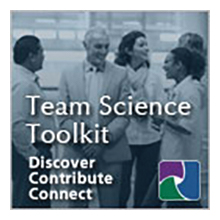|
Stephen M. Fiore
Abstract: Scientific software plays an increasingly important role in science. Across scientific disciplines, it plays a prominent role in scientific discovery. From its role in data collection, to synthesis, analysis, interpretation, and modeling scientific software is essential to the scientific ecosystem. Scientific software ranges from formulas in spreadsheets to complex models that require supercomputers in order to run. Increasingly, different disciplines are brought in to collaborate with computational science teams with members coming from particular fields to provide domain expertise, computer scientists to develop algorithms and develop appropriate data structures, information scientists to support accessing and using relevant data, as well as software engineers to develop the methods and tools for the varied needs of the technology. Despite its ubiquitous presence in science, there has been disproportionately less research on the development of scientific software beyond calls to make science software more 'sustainable'. This panel brings together experts in cognitive science, domain science, and the federal government, to discuss the inherent challenges in improving the development of scientific software. Mr. Chris Lenhardt will represent the perspective of domain scientists and their role on teams developing scientific software. Dr. Elaine Raybourn will discuss ongoing efforts to better understand scientific software team development practices found in aggregate within the Exascale Computing Program that may generalize to open source software organizations. Dr. Stephen M. Fiore will provide a perspective from cognitive science and supporting teams in the development of scientific software. Mr. Shannon McKeen will moderate the panel by providing a set of questions to which each panelist will respond. These include, but are not limited to:
(1) What were the motivations for incorporating the scientific study of teams into the development of scientific software?
(2) What do you think are key deficiencies in education and professional development that hinder scientists collaborating on scientific software development?
(3) How do you think we can develop techniques to address group dynamics that may arise because of demographic differences in teams?
(4) What recommendations would you make to universities to improve scientists ability to contribute to scientific software development teams?
Questions from attendees will also be brought into the discussion. The overarching goal of this panel is to show how the interdisciplinary study of scientific software development can provide both a better understanding of the process as well as provide insights on how to more effectively develop software for science.
|

